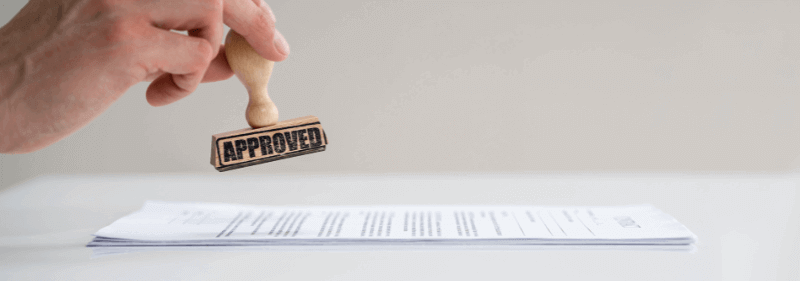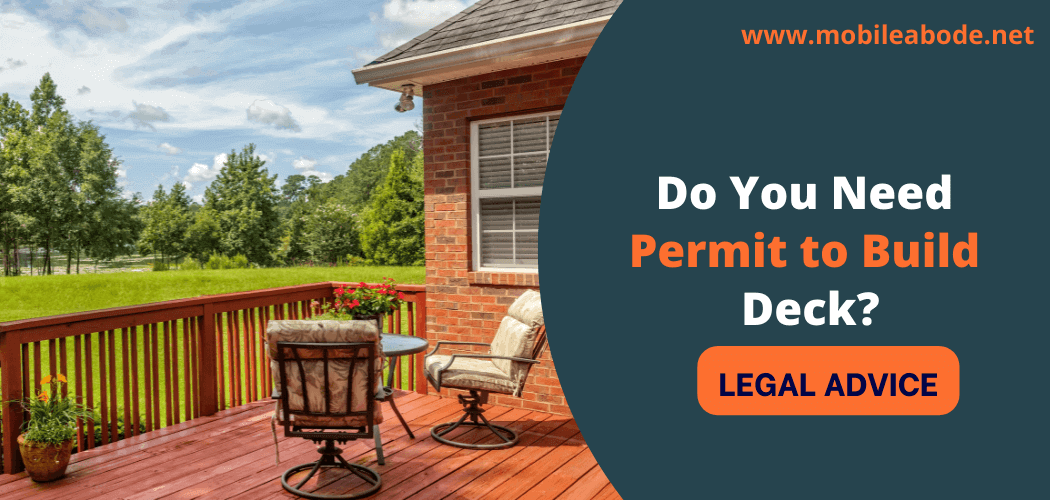Building a deck is a popular home improvement project. Building a deck can be a fun and rewarding project, but it’s important to make sure you are following all the necessary local regulations.
As the weather starts to get warmer, many homeowners are starting to think about ways to improve their outdoor living space. If you’re thinking about building a deck, you may be wondering if you need a permit.
In this blog post, we’ll answer that question and tell you what you need to know before starting your deck project.
What is a permit and what does it allow you to do?
A permit is an official document issued by a government agency that allows you to do something that would otherwise be illegal.
There are many different types of permits, and the requirements for obtaining one vary depending on the activity you wish to engage in and the location where you plan to do it.
In some cases, you may need to submit an application and pay a fee; in others, you may simply need to show up at a certain time and place with the proper identification.
Permits are typically required for activities that have the potential to cause harm to people or property that are regulated in some way by the government.
Examples of activities that usually require a permit include construction, demolitions, events, firearms, hunting, landscape work, and weddings.
Do You Need a Permit to Build a Deck?
Building a deck can be a great way to extend your home’s living space and add value to your property. But before you start construction, you need to make sure you have the proper permits in place. Depending on the size and location of your deck, you may need to get a building permit from your local municipality.
However, there are some exceptions to this rule.
For example, if you live in a historic district or an area with special zoning regulations, you may need to get a permit no matter how small your deck is.
Decks that are higher than 30 inches off the ground or attached to the house will likely require a permit. If you’re not sure if your deck needs a permit, it’s always best to check with your local building department before starting construction.
Obtaining a permit for your deck may seem like a hassle, but it’s a good thing. Getting a permit ensures that your deck is built to code and up to local safety standards. This can save you from costly repairs or even lawsuits down the road.
So, if you’re planning on building a deck, make sure you do your research and get the proper permits before starting construction. It may take a little extra time upfront, but it will be well worth it in the end.
What kind of decks require permits?
There is no universal answer to this question as it depends on the specific building code requirements in your jurisdiction. However, generally speaking most decks that are attached to a house or other primary structure will require a permit, while free-standing decks may not. It is always best to check with your local building department to be sure.
In some cases, even decks that are not attached to a house may require a permit if they are more than a certain height off the ground. For example, in many jurisdictions, any deck that is more than 30 inches above the ground will require a permit.
If you are unsure whether or not your deck project will require a permit, it is always best to err on the side of caution and submit a building permit application. The building department can then let you know if a permit is required.
How to apply for a deck permit?
If you’re planning on adding a deck to your home, you’ll need to apply for a permit from your local municipality. The process and requirements vary depending on where you live, but the general steps are as follows:
- Check with your local building department to see if a permit is required for decks in your area.
- If a permit is needed, submit a completed application form along with any required documents and fees.
- Once your application has been reviewed and approved, you’ll be issued a permit that will allow you to proceed with construction.
- Follow all applicable building codes and regulations when constructing your deck.
- Inspections may be required at various stages of construction, so be sure to schedule these in advance.
- Once your deck is complete, you’ll need to obtain a final inspection from the building department to ensure that it meets all code requirements.
With proper planning and execution, adding a deck can be a great way to enhance your home’s value and enjoyment. By following the steps above, you can ensure that the process goes smoothly and that your new deck will be safe and up to code.
What happens if you don’t get a permit?
If you choose to build your deck without a permit, you are taking a risk. Depending on the jurisdiction, you may be subject to a fine if you are caught. In some cases, you may also be required to tear down the deck and start from scratch.
It’s important to remember that building codes exist for a reason. They are designed to ensure that structures are safe and up to code. By skipping the permitting process, you are increasing the chances that your deck will not meet these standards. This could lead to serious safety hazards or even legal problems down the road.
So, while it may be tempting to cut corners by avoiding the permitting process, it’s simply not worth the risk. Taking the time to get a permit may seem like a hassle, but it’s a necessary step to ensure that your deck is safe and up to code.
How much does it cost to get a permit?
The cost of a deck permit varies depending on the place in which you live. In most cases, the fee is based on the size and scope of the project. For example, a small deck might cost around $100 to permit, while a large deck could cost up to $1,000.
Of course, these are just estimates. The best way to get an accurate idea of the permit fee is to contact your local building department. They will be able to give you a more specific estimate based on the details of your project.
In some cases, you may be able to reduce the cost of your permit by doing some or all of the work yourself. For example, if you are planning a simple deck that does not require any electrical work, you may be able to get a permit for a reduced fee.
FAQs – Permit for Deck Construction

Is it cheaper to build a deck yourself?
The cost of building a deck varies depending on several factors, such as the materials used, the size of the deck, and the complexity of the design. In general, it is usually cheaper to build a deck yourself than to hire a professional.
However, there are some situations where it might be more expensive to do it yourself. For example, if you need to rent specialized equipment or hire a professional to help with the design, the cost can add up quickly.
If you’re on a tight budget, it’s important to compare the cost of materials, labor, and permits before making a decision. In some cases, it might be cheaper to hire a professional to build the deck for you.
What to do before building a deck?
Building a deck can be a big investment, so it’s important to do your research before getting started. Here are a few things to keep in mind:
- Check with your local building department to see if a permit is required.
- Choose the right location for your deck. Consider factors such as privacy, sun exposure, and views.
- Determine the size and shape of your deck.
- Decide on the materials you will use. Pressure-treated lumber is a popular choice because it is durable and economical.
- Choose a design that fits your needs and preferences. There are many different deck designs to choose from, so be sure to browse through some books or websites for inspiration.
- Make a budget and stick to it. Building a deck can be expensive, so it’s important to set a budget and stick to it.
- Hire a professional if you’re not confident in your ability to build the deck yourself. It’s important to make sure the deck is built correctly and up to code.
Can I build a deck on the ground?
In most cases, yes. Building a deck on the ground is not much different than building a deck on a raised platform. The main difference is that you will need to excavate a hole for the posts and footings.
Building a deck on the ground is also cheaper than building a raised deck because you don’t need to pour concrete footings. However, it’s important to make sure the ground is level and well-drained before you start.
Can you build a deck on top of grass?
Yes, you can build a deck on top of the grass, but it’s not recommended. It’s much easier to build a deck on a level surface, such as concrete or paving stones. If you do build your deck on grass, be sure to excavate the area first and compact the soil. You will also need to provide additional support for the deck, such as concrete footings.
How much does it cost to build a 4×4 deck?
The cost of building a 4×4 deck varies depending on the materials used, the size of the deck, and the complexity of the design. In general, you can expect to pay around $100-$200 for the materials and another $100-$200 for labor.
However, there are some situations where it might be more expensive to do it yourself.
Final Words
The short answer is Yes, you need a permit to build a deck. Building without a permit can result in fines and even having your deck taken down. There are some exceptions to this rule but for the most part if you’re planning on building a deck, you need to get a permit.
In some cases, you may not need a permit if your deck is less than 200 square feet and doesn’t have stairs or a railing. However, it’s always best to check with your local building department to be sure.
And remember, even if you don’t need a permit, there are still other things you’ll need to consider when building your deck such as safety features like railings and stairs.
So consult with an expert before starting your project!

